|
“See, I am sending an angel before you, to guard you on the way and bring you to the place I have prepared. Be attentive to him and obey him.” -Exodus 23:20-21 I grew up having a devotion to angels, especially the archangels Gabriel, Raphael, and Michael, whose feast we celebrate tomorrow. Because my sister was born on this feast, my parents gave her the middle name Gabriela in honor of my mother and of the Archangel Gabriel – messenger of Good News. When I was a child, my mom often mentioned Raphael the Archangel as one of her favorite saints. She had prayed to him as a single woman because of his role in the Book of Tobit in bringing together Tobias and Sarah. Because of his intercession, she said, she met and married my father. Throughout their marriage, a photo of St. Raphael has always hung in their bedroom. Our devotion to St. Michael was uttered each day as we asked for his protection and intercession in the St. Michael prayer. Because of my upbringing, I have come to know and love the angels as allies and friends. But what exactly is an angel? Are they ghosts, human beings with wings, or simply fairytales? In a morning meditation in 2014, Pope Francis urged us not to consider the Church doctrine on the existence of angels to be “a little imaginative.” Angels are real and active in the life of the Church and world today. “As purely spiritual creatures,” the Catechism writes, “angels have intelligence and will: they are personal and immortal creatures.” (CCC330). The Church’s teaching on the existence of angels comes from Scripture and Tradition. Angels are the result of God’s creative work. When we say in the Nicene Creed that we believe in things both “visible and invisible,” we testify to the existence not only of physical creation, but also of spiritual creation. As servants of God, angels appear numerous times throughout Scripture in various roles and capacities. Angels guarded the Garden of Eden after the Fall of Adam and Eve, led the Israelites out of Egypt to the Promised Land, announced the birth of John the Baptist, appeared to St. Joseph in several dreams, and perhaps most notably, announced the birth of Christ to the Blessed Virgin Mary. Scripture also notes that the angels ministered to Jesus after his forty days of prayer and temptation in the desert at the beginning of his ministry, and that Christ was strengthened by an angel during the agony in the garden of Gethsemane. Not only did angels exist in Biblical times, but they are also present to each one of us every day. St. Basil the Great taught that "each and every member of the faithful has a Guardian Angel to protect, guard and guide them through life.” The Catechism reiterates this belief, stating, “From its beginning until death, human life is surrounded by their watchful care and intercession. Beside each believer stands an angel as protector and shepherd leading him to life." Angels, therefore, were created by God to praise and glorify him, as well as to serve as his messengers and our protectors, instructors, and allies. Our guardian angels are a gift from God to help each one of us achieve eternal life. As we read in Hebrews, "Are they not all ministering spirits sent forth to serve, for the sake of those who are to obtain salvation?” The beauty of their existence means that, as human beings, we are never alone. We journey through this life with a celestial companion who wills our good and helps us achieve sanctity. Pope John Paul II wrote that devotion to our guardian angels and the angels overall leads to two outcomes: gratitude to God and peace and confidence. As we know, growth in the spiritual life can be difficult on our own. Each day we are called to overcome many temptations and weaknesses, to be healed, to grow in virtue. In God’s generosity, he not only gave us the gift of the Church and sacraments to receive grace and strengthen us on our journey; he also gives us celestial help through the existence of angels. As we prepare to celebrate the Feast of the Archangels tomorrow, Pope Francis leaves us with pertinent and thought-provoking questions: “How is my relationship with my guardian angel? Do I listen to him? Do I say good morning to him in the morning? Do I ask him: ‘Watch over me when I sleep?’ Do I speak with him? Do I ask his advice? … We can answer this question today, each of us: how is our relationship with this angel that the Lord has sent to watch over me and accompany me on my journey, and who always sees the face of the Father who is in heaven?” — Pope Francis, Homily, October 2, 2015
0 Comments
“…the Church wants again to state her desire to encounter, accompany, and care for every young person, without exception.” -Pope Francis What is the role of youth and young adults within our Church? How can the Church better listen to their desires, dreams, and needs, and empower them as contributing members of the Body of Christ? What are young people seeking and how can the Church better minister to them during this transformative time in their lives? These are a few of the types of questions asked and discussed at the National Dialogue on Catholic Pastoral Ministry with Youth and Young Adults in Chicago from September 17-19. With representatives from almost fifty Catholic organizations, apostolates, and diocese around the United States, the National Dialogue brought pastoral leaders working with youth and young adults together in order to discuss the future of pastoral ministry to the young church. This dialogue was called for by the United States bishops and co-hosted with the National Federation for Catholic Youth Ministry (NFCYM) and the National Catholic Network de Pastoral Juvenil Hispana (LaRed). The National Dialogue was organized to unify, engage, and mobilize church leaders working with youth and young adults in preparation for the XV Ordinary General Assembly of the Synod of Bishops on “Young People, the Faith, and Vocational Discernment” called for by Pope Francis in Rome in October of 2018, as well as the V Encuentro called for by organizations advocating for Hispanic Ministry. According to their website, “The vision of this initiative is an energized and unified Church committed to forming and engaging youth and young adults as missionary disciples.” The Catholic Apostolate Center was honored to be invited to participate in the National Dialogue this year. As a ministry of the Society of the Catholic Apostolate (Pallottines) - Immaculate Conception Province founded in 2011 to respond to the needs of the church, the Center has worked with and for active young adult Catholics in a variety of ways. Most notably, the Center has developed the ten-week formation program Apostles on Mission in collaboration with the Archdiocese of Washington to help young adults become active evangelizers. As our patron, St. Vincent Pallotti, believed, we are all called to be apostles—what Pope Francis calls missionary disciples. Through efforts such as Apostles on Mission, as well as our online Catholic resources, webinars, podcasts, social media presence and blog, the Catholic Apostolate Center works to revive faith, rekindle charity, and form apostles across all ages and experiences within our Catholic faith. As Pope Francis wrote in the Preparatory Document for the 2018 synod, “Proclaiming the joy of the Gospel is the mission entrusted by the Lord to His Church.” We are excited to see how the collaborative fruits of the National Dialogue help us to fulfill that mission and continue to work to spread the joy of the Gospel each day. “The New Evangelization is accomplished with a smile, not a frown.” – Cardinal Timothy Dolan (Address to the College of Cardinals, February 2012)
There is nothing simplistic about Cardinal Dolan’s point above. Some, who are not examining it carefully, might see it as such. No, instead, in a short, pithy comment that is very emblematic of his style of speaking, he is summarizing his main point that “the missionary, the evangelist, must be a person of joy.” Sadly, there are many dour people among the baptized who Pope Francis calls “sourpusses” in Evangelii Gaudium, n. 85. Interestingly enough, Pope Francis uses this word not simply as a rebuke to those who hold a particular view, but instead as a call to trust in the One who sends us forth, Jesus Christ. “One of the more serious temptations which stifles boldness and zeal is a defeatism which turns us into querulous and disillusioned pessimists, ‘sourpusses’. Nobody can go off to battle unless he is fully convinced of victory beforehand. If we start without confidence, we have already lost half the battle and we bury our talents. While painfully aware of our own frailties, we have to march on without giving in, keeping in mind what the Lord said to Saint Paul: ‘My grace is sufficient for you, for my power is made perfect in weakness’ (2 Cor 12:9).” The smile then on the face of the joyful evangelizer is one of confidence in Christ. Note that it is confidence, not arrogance. Some confuse the two and become self-proclaimed judges of the level of Catholicity of another. Instead, we are called to docility in Christ, a trait that is not practiced often enough. It is a humility that understands that no one person has every answer. We look rather to the community of faith, the Church, for our guidance, our deeper understanding, and our unity with one another amid our diversity. As Pope Francis teaches, “differences between persons and communities can sometimes prove uncomfortable, but the Holy Spirit, who is the source of that diversity, can bring forth something good from all things and turn it into an attractive means of evangelization” (EG, n. 131). Let us go forth, then, joyfully – as evangelizers, as missionary disciples, as apostles – as those who are fully confident in the message that we have received, that Jesus Christ is Lord and Savior of all and that the Church shares this good news and continues his mission until he comes again. May the Charity of Christ urge us on! Preparing for Hurricane Irma has given me a fresh perspective on what matters most. With each alert, evacuation notice, and email telling me that work would be canceled for “x” amount of days, my panic level rose. The uncertainty of the storm’s path falling on my city and then my family’s city kept us all in constant contact reviewing our emergency plans. Social media messages from friend to friend with notes of encouragement and “hurricane hacks” brought us all closer together around the state. Thankfully, I am located in north central Florida, where Hurricane Irma caused less damage than its two landfalls near Naples and The Keys. Prepping my house and selecting the most important items to protect for survival is very humbling. While packing, I thought of my fellow Floridians who evacuated south Florida not knowing if they will have a home to come back to. I thought of those in the Caribbean who received the brunt of Hurricane Irma’s force. I thought of the victims in Texas who battled Hurricane Harvey and continue to cope with its aftermath. These natural disasters remind us of the sanctity of life, what is most important. With the hurricane covering the entire state of Florida, I thought of how small I am—especially in comparison to what God can accomplish. During times of natural disasters, reliance and trust in him increases. One of my neighbors reminded me of the story in Matthew 8:23-27, when Jesus calmed the storm at sea. Jesus told his disciples, “‘Why are you terrified, O you of little faith?’ Then he got up, rebuked the winds and the sea, and there was great calm.” My neighbor told me, “He did it once, and he can do it again!” Her faith was inspiring to me and instantly calmed my nerves. When someone asks, “Where is God in this storm? Why did he create this?” my answer is that God is in those who help others and respond with service and compassion during times of trial and suffering. 1 Corinthians 12 tells us that we are Christ’s body and form individual parts of it. We are the hands and feet of Christ in the world. We may not see the ways God is helping at first because these ways may not necessarily be our ways. I truly believe acts of kindness, such as neighbors checking in on one another and helping one another prepare their homes and families, provide hope during times of fear or suffering. The selfless love of fellow citizens encourages each of us to do what we can for others, in this case, those affected by these recent storms. There are students, faculty, and staff from the University of Florida, where I work, who are ready to jump into action after the storm passes to help others by donating food and clothing, assisting displaced pets, and more. We grieve with those who hurt and find ways to help alleviate their suffering. Rather than filling my thoughts with why this storm has happened, I instead thank God for the blessings he has provided my family and me. Ultimately, God does not cause the storm (or evil), he simply permits the natural way of the world, just as he does with the free will of human beings. Romans 8:28 tells us that God is always working for our good or working to bring about good and turn even a bad situation into a blessing. I am comforted by this thought. During this time of hardship for many in our country, I pray that we may come together and serve one another in order to bring good out of suffering. May we continue to be the hands and feet of Christ to our brothers and sisters. “Dear catechists, I thank you for what you do, but especially because you walk with the People of God. I encourage you to be joyful messengers, custodians of the good and of the beauty which shines through the faithful life of the missionary disciple.” – Pope Francis (Message to Participants in the First International Catechetical Symposium, July 5, 2017) On September 17, the Catholic Church in the United States will celebrate Catechetical Sunday with the theme, “Living as Missionary Disciples.” This theme is taken from the apostolic exhortation of Pope Francis, Evangelii Gaudium (The Joy of the Gospel). The recent Convocation of Catholic Leaders focused the Church in the United States on ways in which we can live the “The Joy of the Gospel in America.” In a time in the United States that is marked less by joy, love, peace, and unity and more by anguish, hate, violence, and division, the work of missionary disciples, and particularly those who form missionary disciples, is critically important. Catechists are called to joyfully witness and teach the faith not simply as a set of rules, regulations, or esoteric beliefs, but as true life and freedom in Jesus Christ. The mission field of the catechist is a vast one in our culture today. The classroom is only one place of witness and teaching. More so, we witness the love of Christ in workplaces, schools, and families, among friends, in the public square, and even in a ministry, apostolate, or parish church. As the Bishops of the United States teach, “We become missionary disciples when we take our encounter with Jesus Christ out into the world” (Living as Missionary Disciples, 17). We, then, as the baptized, must witness Jesus Christ in the world, not simply in the Church, responding to the love of Christ that we have encountered. We are sent into the world to accompany others into their own encounter with Jesus Christ and the community of faith, the Church. This is how we live as missionary disciples. This is how we evangelize most effectively, not simply by words, but particularly by deeds. As St. Vincent Pallotti said almost two centuries ago, “Remember that the Christian life is one of action; not of speech and daydreams. Let there be few words and many deeds, and let them be done well." May the Charity of Christ urge us on!
Not long ago, I sat listening to the words of my university’s honored commencement speaker, Peggy Noonan, who entreated us to do something after we graduated that day: “You must not stop reading books. That’s all. If you seek a happy and interesting life, one of depth, meaning and accomplishment, you must read books.” I thought that to be a simple message—but refreshingly concrete and unique. As she pointed out, to get to graduation day my peers and I had read a number of books. Most were works assigned as required reading for a course rather than for leisure. Continuing to read after a life in school would benefit us, Noonan said, as we moved through life to new places, with new people, and into new positions.
As a Catholic, I took Ms. Noonan’s advice as an opportunity to seriously take up spiritual reading. I previously had taken advantage of my Catholic high school’s library to some degree, but I often had to let spiritual reading take second place behind the demands of other commitments. This continued in college with the much larger university library collections. There seemed to be no time to read for the sake of reading, spiritual or otherwise. While I may not have had much choice at the time, I know that when the faithful disregard the great literary works of Catholicism, we do ourselves a great disservice. With its full and ever-expanding breadth of writings, the Church encourages the faithful to enrich themselves through the works of popes, saints, and the Magisterium, along with theologians, mystics, clergy, and religious (see CCC 133). These can offer many insightful perspectives on the Faith, but they cannot replace reading the Bible! As St. Jerome remarked, “Ignorance of Scripture is ignorance of Christ!” Similarly, the Second Vatican Council affirmed the Word of God as “food for the soul, the pure and everlasting source of spiritual life.” (Dei Verbum, 21) We may spend years studying books for school and for professional development—how much more should we pore over the Word of God “to build you up and give you your heritage among all those who are sanctified”? We nourish ourselves with physical food multiple times a day, shouldn’t we do the same with spiritual nourishment? When I worked in a Catholic bookstore, my boss shared this insight from St. John Bosco: “Only God knows the good that can come about by reading one good Catholic book.” Customers might have wandered in to buy a rosary or Catholic memorabilia, but many times I noticed them stop in front of a display of books on family life, spirituality, or healing prayers. As I assisted them with their selections, many would share their favorite devotions or ask for guidance in selecting a title. The customers were seeking writings by those whose experiences they could relate to—authors whose work would speak to our customers just as Sacred Scripture speaks to each of us and motivates us to seek and undertake the will of God. On other occasions, customers would simply be looking for something new to deepen their spirituality and share what they learned with their family and friends. I have observed that the benefits of supporting Catholic bookstores extend in many ways: not only does it help a business to continue providing accessible, quality literature, but it also offers customers the chance to find something meaningful and wholesome that will be useful in subsequent questions, reflections, and experiences long after the first reading. Consider dusting off your Bible or picking up that Catholic book on your table. Spend a few moments and allow yourself to be touched by the author’s message and then share the experience with loved ones. Start a book club with friends and neighbors to discuss a spiritual work and apply it to your day to day life. The words of an approved source can galvanize, console, clarify, educate, or guide your spiritual formation. As Ms. Noonan reminded us, continual reading throughout our lives, especially of spiritual works, will give our lives greater depth and meaning. Start by picking up the book. Questions for Reflection: Is there a spiritual book or book from the Bible you’ve been meaning to read? How has a book or Scripture passage impacted your life? "Don't look for big things. Just do small things with great love." Many of us are familiar with these words from Mother Teresa, a reminder that we will be measured against the depth of our love, not the number of great deeds we’ve done. It’s also become a personal mantra whenever I think about the idea of missionary discipleship. “We become missionary disciples when we take our encounter with Jesus Christ out into the world,” the United States Bishops stated in their document Living as Missionary Disciples. They continue, “As a Church, we are called to be missionary disciples who know and live the faith and confidently share the Gospel.” My part-time work with the Catholic Apostolate Center keeps me plugged into the ministry world, but whenever I step out of the “Catholic bubble,” evangelization gets difficult fast. It’s easy to talk about missionary discipleship in theoretical terms among engaged Catholics. The call to actually be a missionary disciple, however, becomes a challenge when I’m the only engaged Catholic in the room. During my day job as a civil engineer, I encounter coworkers and clients from all kinds of backgrounds. The opportunity to evangelize is enormous, but where do I start? If we’re all called, by virtue of our baptism, to “go make disciples of all nations,” then aren’t I supposed to be evangelizing everyone I meet? How am I supposed to do that without making people think I’m a kooky religious fanatic? Being Catholic is at the core of who I am—but, to many, that does sound kind of kooky! So how do I do this missionary discipleship thing? How do I evangelize without going too deep too fast? I once heard someone compare evangelization to trying to teach particle physics: You don’t just start with the Higgs boson and expect people to get it. You start with the basics. The same goes for the mission of evangelizing the world. Start with the basics. Or, as Mother Teresa said, “Just do small things with great love.” I don’t have to pass out copies of Magnificat or start a lunchtime Bible study in order to be a missionary disciple. All it takes is planting a seed here and there: keeping an icon of Our Lady of Perpetual Help on my desk, silently offering a prayer before lunch (when I don’t forget!), even simply treating my coworkers with kindness and respect. All of these small things add up when done with great love. People notice and they wonder: “Why?” I vividly remember an encounter I once had in a Chick-fil-A. The cashier, friendly as they always are, randomly asked what church I went to. I told him, wondering aloud what made him ask. Without missing a beat, he said, “Because your light shines.” Ironically, I was in the midst of a rough patch and had taken the semester off of school. In spite of my own trials, all it took was treating the guy like a person in order to elicit that response. We’re so tempted to think that big accomplishments and programs are all that command people’s attention, but it’s really the opposite. The big stuff fades from our memories faster than a sensational Internet meme or viral cat video. But the little things people do, the kindness and love with which we regard one another, that’s what’s remembered. And that’s what opens people’s hearts to God. Missionary discipleship isn’t rocket science, or even particle physics. It’s about doing small things with great love. Question for Reflection: What are some small things you can do to spread the love of God wherever you go? For more information on how you can be a Missionary Disciple, visit the Catholic Apostolate Center’s resource page here. Click here to read Living as Missionary Disciples: A Resource for Evangelization.  This past winter, as I knelt in prayer at the tomb of the Blessed Elisabetta Sanna, I experienced a great sense of peace. I also felt a profound connection to this holy woman, who is largely unknown in the United States. I was blessed to be in Rome on a pilgrimage with a few great friends during our university’s winter break. Before embarking on the pilgrimage, my thoughts chiefly centered on finishing final exams and looking forward to having the opportunity to pray with Pope Francis at St. Peter’s Basilica. This opportunity with the Holy Father ended up becoming a moment I will always treasure. Yet, as I reflect back on the pilgrimage, it is clear that my encounter with the Venerable Elisabetta Sanna in the small Church of San Salvatore in Onda left the greatest mark on my spiritual life. Born in 1788, Elisabetta Sanna grew up in Sardinia. When only three months old, Elisabetta contracted smallpox, a disease that left her physically handicap for the rest of her life. Despite her disability, Elisabetta married and had seven children. She became well known in her town for devoting herself to the catechetical education of youth. Elisabetta also educated women from the town in basic Christian doctrine. After her husband died in 1825, Elisabetta decided to make a pilgrimage to the Holy Land and entrusted her children to the care of her mother and brother. Though she started her pilgrimage, Elisabetta never made it to the Holy Land, instead going to Rome. It was in Rome that she met a humble priest with a bold vision proclaiming that all the baptized were called to be apostles. This priest, Fr. Vincent Pallotti, would become her spiritual director, as well as a saint. He was canonized on January 20th, 1963 by Pope John XXIII. While Elisabetta planned on returning to her children in Sardinia, her physical disability prevented her from travelling back. Hence, while understandably upset, Elisabetta remained in Rome and continued to selflessly serve others in collaboration with Fr. Vincent Pallotti. In addition to performing multiple works of mercy, such as visiting the terminally ill, Elisabetta’s life was rooted in prayer. Both Sacred Scripture and the Holy Mass gave her the ability to be the face of Christ to the marginalized. In other words, Elisabetta’s love for Jesus Christ, which was grounded in her personal prayer, impelled her to the apostolate. What I find so remarkable and inspiring about Elisabetta’s life is that her path towards holiness appears so un-extraordinary. She was not the founder of a religious community, nor did she author a great theological treatise. Yet, it is exactly the ordinariness of her life that makes her so extraordinary. Elisabetta’s life is important because it demonstrates that God calls each one of us, in whatever place, in whatever situation, to be apostles. If you begin to doubt your ability to do great things for Jesus, look to the example of Elisabetta. I invite you to pray for her intercession and ask her to assist you in living out your vocation to be an apostle. For more resources on the Blessed Elisabetta Sanna, click here. Editors Note: This blog post was originally published on July 7, 2016 and Elisabetta Sanna was beatified on September 17, 2016. |
Details
Archives
July 2024
Categories
All
|
About |
Media |
© COPYRIGHT 2024 | ALL RIGHTS RESERVED

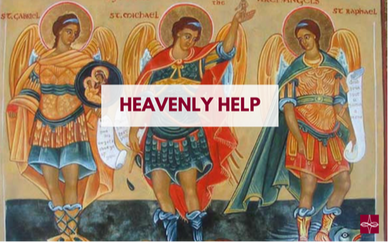



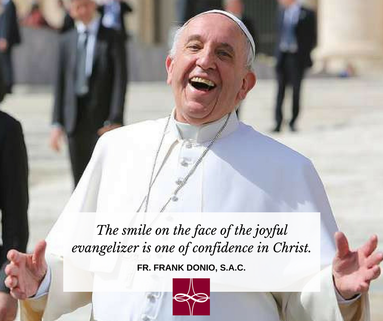
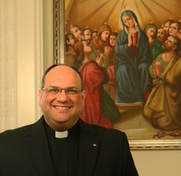


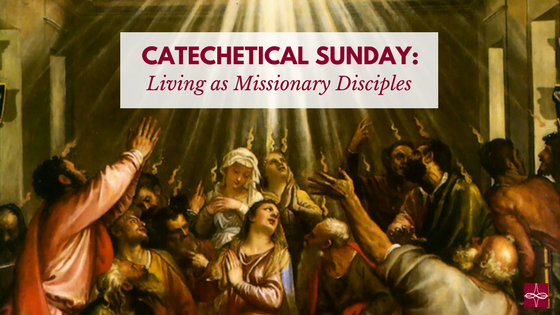


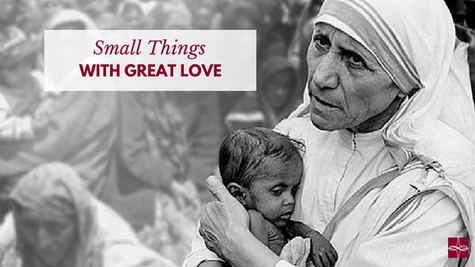

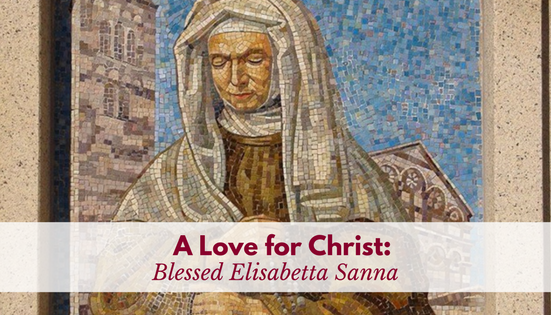

 RSS Feed
RSS Feed